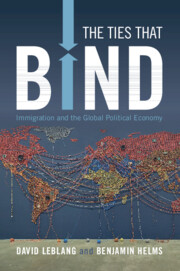2 - Origins
Why Do People Migrate?
Published online by Cambridge University Press: 02 February 2023
Summary
Why do people migrate? We review existing answers that focus on the role of economics and social networks. This work fails to appreciate that, all else equal, far more people remain at home than express an interest in moving abroad.Focusing on political conditions, we argue that political conditions and institutions are just as important to understand human mobility. Analyzing a wealth of globally representative, individual-level data on the emigration process, we find that factors such as the quality of public goods, confidence in political institutions, and perceptions of physical safety drive migration decisions. The importance of political conditions grows with an emigrant’s level of education, and quality governance can mitigate the impact of other “push” factors such as declining economic conditions and social networks. We emphasize that any understanding of the decision to migrate must grapple with political conditions in migrant-sending countries.
Keywords
- Type
- Chapter
- Information
- The Ties That BindImmigration and the Global Political Economy, pp. 16 - 57Publisher: Cambridge University PressPrint publication year: 2023

